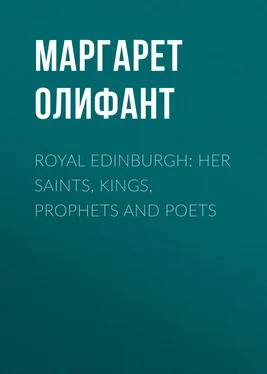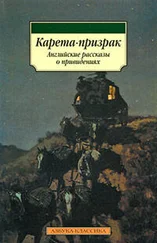Маргарет Олифант - Royal Edinburgh - Her Saints, Kings, Prophets and Poets
Здесь есть возможность читать онлайн «Маргарет Олифант - Royal Edinburgh - Her Saints, Kings, Prophets and Poets» — ознакомительный отрывок электронной книги совершенно бесплатно, а после прочтения отрывка купить полную версию. В некоторых случаях можно слушать аудио, скачать через торрент в формате fb2 и присутствует краткое содержание. Жанр: foreign_prose, История, literature_19, foreign_edu, foreign_antique, на английском языке. Описание произведения, (предисловие) а так же отзывы посетителей доступны на портале библиотеки ЛибКат.
- Название:Royal Edinburgh: Her Saints, Kings, Prophets and Poets
- Автор:
- Жанр:
- Год:неизвестен
- ISBN:нет данных
- Рейтинг книги:4 / 5. Голосов: 1
-
Избранное:Добавить в избранное
- Отзывы:
-
Ваша оценка:
- 80
- 1
- 2
- 3
- 4
- 5
Royal Edinburgh: Her Saints, Kings, Prophets and Poets: краткое содержание, описание и аннотация
Предлагаем к чтению аннотацию, описание, краткое содержание или предисловие (зависит от того, что написал сам автор книги «Royal Edinburgh: Her Saints, Kings, Prophets and Poets»). Если вы не нашли необходимую информацию о книге — напишите в комментариях, мы постараемся отыскать её.
Royal Edinburgh: Her Saints, Kings, Prophets and Poets — читать онлайн ознакомительный отрывок
Ниже представлен текст книги, разбитый по страницам. Система сохранения места последней прочитанной страницы, позволяет с удобством читать онлайн бесплатно книгу «Royal Edinburgh: Her Saints, Kings, Prophets and Poets», без необходимости каждый раз заново искать на чём Вы остановились. Поставьте закладку, и сможете в любой момент перейти на страницу, на которой закончили чтение.
Интервал:
Закладка:
And it is something worth noting that this image of purity and excellence was no monkish vision of the purity of the cloister, but that more complete and at the same time more humble ideal of the true wife, mother, and mistress, whose work was in and for the world and the people, not withdrawn to any exceptional refuge or shelter—which has always been most dear to the Anglo-Saxon race. The influence of such an example in a country where manners and morals were equally rudimentary, where the cloister proved often the only refuge for women, and even that not always a safe one—was incalculable, and the protection of a virtuous Court something altogether novel and admirable. The gentlewomen who worked at their tapestry under Margaret's eye, and learned the gentler manners of other Courts and countries of old civilisation by her side, and did their wooing modestly with the sanction of her approval, must have changed the atmosphere of the north in the most wonderful way and quickened every current of national development though the influence was remote and the revolution unperceived. The chroniclers go back with a fond persistence to the story of Margaret and her sons, and the number of her family and the circumstances of her marriage and of her death. Before her there is little but fable; after her the stream of history flows clear. The story of Macbeth, which is, yet is not, the Shakspearian drama, and accordingly takes quite a curious distinct flow of its own, like a new and imperfect version of something already familiarly known, is the only episode of secular history that has any reality before we come, in the next generation, to herself and her King. The earlier annals of Adamnan, the life of Columba and the records of his sacred isle, belong to those ever-living ever-continuing legends of the saints in which the story of the nations counts for little. But Margaret was fortunately secular, and though a saint, a great and influential personage in the front of everything, and also a woman in the fullest tide of life to whom all human events were happening; who lived by love and died of grief, and reigned and rejoiced and triumphed as well as suffered and prayed.
There followed, however, a terrible moment for that new Scottish-Saxon royal family, when both their parents were thus taken from them. Donald Bane set up a brief authority, restoring the old kingdom and banishing, after the familiar use and wont of such revolutions, his brother's children from Scotland. Of these children, however, but three sons are mentioned: Edgar, Alexander, and David, who must all have been under age at the time. Ethelred, who had the dangerous office of conveying his brothers and sisters along with his mother's body to Dunfermline, died or was killed immediately after this feat, and was laid with the King and Queen before the rood altar in Dunfermline; and of Edmund, an elder son, we have but a confused account, Wynton and Fordun both describing him as "a man of gret wertu," who died in religion, having taken the cowl of a monk of Cluny; whereas William of Malmesbury accuses him of treachery and complicity in the murder of his base-born brother Duncan. However this might be, he was at least swept from the succession, in which there is no mention of him. Malcolm's lawful heirs were thus reduced to the three boys whom their uncle, Edgar Atheling, had received in England. But Donald Bane was not long permitted to enjoy his conquest in peace. Duncan, the illegitimate son (but this counted for little in those days) of Malcolm, who was a hostage in England, after his uncle had held the sovereign power for six months, made a rush upon Scotland with the help of an English army, and overcame and displaced Donald; but in his turn was overcome after a reign of a year and a half, Donald Bane again resuming the power, which he held for three years more. By this time young Edgar, Margaret's son, had come to man's estate, and with the help of the faithful Saxons who still adhered to his uncle, Edgar Atheling, and encouraged by dreams and revelations that the crown was to be his, came back to Scotland and succeeded finally in overcoming Donald and securing his inheritance. The period of anarchy and trouble lasted for five years, and no doubt the civilisation and good order which Malcolm and Margaret had toiled to establish were for the moment much disturbed. But after Edgar's succession the interrupted progress was resumed. "He was a man of faire havyng," says old Wynton, and in his time the Saxon race came again to great honour and promotion, at once by his own firm establishment upon the Scottish throne, and by the marriage of his sister Maud to the new King of England, Henry I., which restored the Saxon succession and united right to might in England. Thus after a moment of darkness and downfall the seed of the righteous took root again and prospered, and the children of St. Margaret occupied both thrones. Edgar, like so many of his race, died childless; but he was peacefully succeeded by his brother Alexander, who, though as much devoted to church-building and good works as the rest of his family, was apparently a more warlike personage, since he was called Alexander the Fierce, an alarming title, and was apparently most prompt and thoroughgoing in crushing rebellion and other little incidents of the age. He was succeeded in his turn by the youngest of Margaret's sons, David, that "sair sanct for the crown," who covered Scotland with ecclesiastical foundations.
"He illumynyd in his dayes
His landys wyth kirkis and abbayis;
Bishoprychs he fand bot foure or three,
Bot or he deyd nyne left he."
Among the many other foundations made by King David was the house of the Holy Rood which has been so familiar a name in Scottish history—built low in the valley at the foot of the surrounding hills and that castle in which the Queen died pressing the black rood—most precious possession—to her dying breast. Whether a recollection of that scene, which might well have impressed itself even on the memory of a child, and of the strange wild funeral procession, with all its associations of grief and terror, which had stumbled down the dangerous rocks in the mist thirty-five years before, was in David's mind, it would be vain to inquire. The black rood of itself, besides these touching and sacred associations, was a relic of almost unequalled sanctity, and well warranted the erection of a holy house for its guardianship and preservation. How far the street, which would be little more than a collection of huts, had crept down the Castle Hill towards the new monastery in the valley there is no evidence to show, but no doubt both the castle and the religious house were soon surrounded by those humble scattered dwellings, and David's charter itself makes it plain that already the borough of Edinburgh was of some importance. Part of the revenues of the monastery were to be derived from the dues and taxes of the town, and it was also endowed with "one half of the tallow, lard, and hides of the beasts slain in Edinburgh," an unsavoury but no doubt valuable gift. The canons of the Abbey of Holyrood, or Holyrood House as it is called from the beginning with a curious particularity, had also permission to build another town between themselves and Edinburgh, which would naturally cluster round the Canon's Gate—the road that led to St. Cuthbert's, at the farther end of the North Loch, where every man could say his mass; or more directly still to the dark little chapel upon the castle rock, made sacred by all its memorials of the blessed Margaret. The nucleus of the future capital is thus plainly apparent between the two great forces of that age, the Church, the great instrument of congregation and civilisation, and the Stronghold, in which at any moment of danger refuge could be taken. It is curious to realise the wild solitude of this historical ridge, with its rude houses coming into being one by one, the low thatched roofs and wattled walls which in the course of time were to give place to buildings so stately. The Canongate would be but a country road leading up towards the strong and gloomy gate which gave entrance to the enceinte of the castle—itself like some eagle's nest perched high among the clouds.
Читать дальшеИнтервал:
Закладка:
Похожие книги на «Royal Edinburgh: Her Saints, Kings, Prophets and Poets»
Представляем Вашему вниманию похожие книги на «Royal Edinburgh: Her Saints, Kings, Prophets and Poets» списком для выбора. Мы отобрали схожую по названию и смыслу литературу в надежде предоставить читателям больше вариантов отыскать новые, интересные, ещё непрочитанные произведения.
Обсуждение, отзывы о книге «Royal Edinburgh: Her Saints, Kings, Prophets and Poets» и просто собственные мнения читателей. Оставьте ваши комментарии, напишите, что Вы думаете о произведении, его смысле или главных героях. Укажите что конкретно понравилось, а что нет, и почему Вы так считаете.












